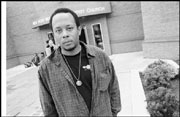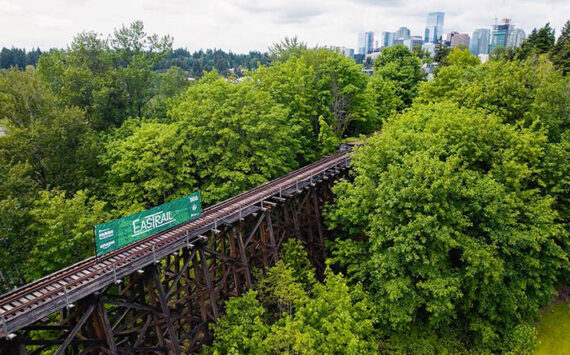IN THE CENTRAL AREA’S New Hope Baptist Church last Monday morning, some 25 teenagers and young adults gathered for a weeklong training on becoming “anti-racist youth organizers.” The day began with some lashing of the police through a game called “sometimes, always, never.” Those assembled moved to a corner of the room depending on their answer to various questions, the first being, “Do you feel the police are here to protect you?” One of two white girls standing in the “always” corner set the tone for the discussion when she explained that, unfortunately, she knows that because of her race the police are here to protect her.
Next up was New Hope’s pastor, the Rev. Robert Jeffrey, who sat on the floor encircled by the crowd. Decrying artificial barriers that he says turn smart people into gang members, Jeffrey declared, “I meet people every day on the street who are 10 times as smart as our president—who if he were black would probably be in prison.” Other parts of the planned curriculum included “using poetry/spoken word for revolutionary change” and a study of the Cuban economic system.
The radical tone of the workshop is not necessarily what you would expect of its sponsor, the American Friends Service Committee, which is the activist arm of the Quakers. Quaker religious services, after all, focus on quiet reflection. But it is what you might expect of Dustin Washington, an organizer of the workshop and the head of an AFSC program devoted to “cross-cultural youth leadership.” Washington’s work underscores how the AFSC has changed over the years and, some would say, become less Quaker.
Together with his mentor and pastor, the Rev. Jeffrey, Washington organized the fieriest protests around the recent Aaron Roberts shooting. (For more on the shooting see “Changing Story,” p. 13.) They essentially accused the police of murder and made a number of demands on the city, and, even more controversially, on Starbucks due to its Central Area presence. When Starbucks declined to enter the fray, they attempted a high-profile, but ultimately unsuccessful, boycott of the store.
Never mentioned in news reports was Washington’s AFSC affiliation, perhaps because reporters couldn’t make sense of the connection. Yet Washington, a boyish-looking African-American 29-year-old with a wisp of a beard, sees his activism as perfectly in keeping with the tradition of AFSC, which he calls a “righteous organization.” The AFSC, he says, actively supported Martin Luther King, opposed the Vietnam War, and, more recently, engaged in civil disobedience by delivering medical supplies to Iraq despite American sanctions.
All radical stuff, which is perhaps not surprising given the nature of the Quakers themselves. The Society of Friends is a Christian religion that rejects hierarchy and instead encourages its members to seek “the inner light” of God within each individual’s soul. Quakers, who number around 117,000 in North America, offer “testimony” to both pacifism and social justice. “Many Quakers would consider themselves radical,” says Bobbi Kelly, an outreach worker at a Quaker retreat center in Pennsylvania called Pendle Hill.
Yet Kelly says that the AFSC has evolved since it was founded as a relief agency during World War I staffed by conscientious objectors. “As they grew, they started doing much more advocacy work than actual relief work.”
Moreover, observes Chuck Fager, editor of a book critiquing the AFSC and author of several others on Quakerism, “since the ’60s, the AFSC has moved steadily away from a meaningful connection with the Society of Friends.” Most AFSC staff are not Quakers, he says, and most of the AFSC’s funding comes from non-Quaker sources. When there is contact, he adds, Quakers are “treated like another special-interest constituency.”
The disassociation has been especially true in the Northwest, says longtime Seattle Quaker Pablo Stanfield, who unlike many of his peers has worked from time to time with the AFSC. “Of all the regional offices of the AFSC, this one has the least contact with the Society of Friends,” he says. Only one staffer in the AFSC’s three Northwest regional offices is a Quaker member.
Inevitably, there is tension between Quakers and the AFSC both locally and nationally, with some Quakers wondering whether the AFSC’s activism is completely consistent with their religion. The AFSC’s activities in Seattle encompass a program for gay, lesbian, transsexual, and questioning youth, as well one trying to mediate the conflict over Makah Indian whaling. Of late, though, Washington’s efforts have drawn particular notice. “I know there are some people who think that Dustin’s not doing things in the classic Ghandian nonviolent way,” says Stanfield.
Regional AFSC director Susan Segall points out that the organization never officially endorsed the Starbucks boycott, even though Washington used staff time to organize the effort. The group that was identified with the boycott, the People’s Coalition for Justice, was formed by Washington as an AFSC staffer but has taken on a life of its own, Segall says. Even so, Segall says the AFSC supports Washington’s work in that and other endeavors. “I see it as being in sync with the larger AFSC value of speaking truth to power.”









